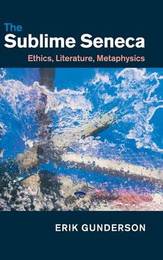
|
The Sublime Seneca: Ethics, Literature, Metaphysics
Hardback
Main Details
Description
This is an extended meditation on ethics in literature across the Senecan corpus. There are two chapters on the Moral Letters, asking how one is to read philosophy or how one can write about being. Moving from the Letters to the Natural Questions and Dialogues, Professor Gunderson explores how authorship works at the level both of the work and of the world, the ethics of seeing, and the question of how one can give up on the here and now and behold instead some other, better ethical sphere. Seneca's tragedies offer words of caution: desire might well subvert reason at its most profound level (Phaedra), or humanity's painful separation from the sublime might be part of some cruel divine plan (The Madness of Hercules). The book concludes by considering what, if anything, we are to make of Seneca's efforts to enlighten us.
Author Biography
Erik Gunderson is Professor of Classics at the University of Toronto. He is the author of four other scholarly monographs: Laughing Awry: Plautus and Tragicomedy (2014); Nox Philologiae: Aulus Gellius and the Fantasy of the Ancient Library (2009); Declamation, Paternity and Roman Identity: Authority and the Rhetorical Self (2003); and Staging Masculinity: The Rhetoric of Performance in the Roman World (2000). He is also the editor of The Cambridge Companion to Ancient Rhetoric (2009). His work spans languages, genres and eras, and he consistently brings to bear modern critical perspectives when exploring the ancient world.
|